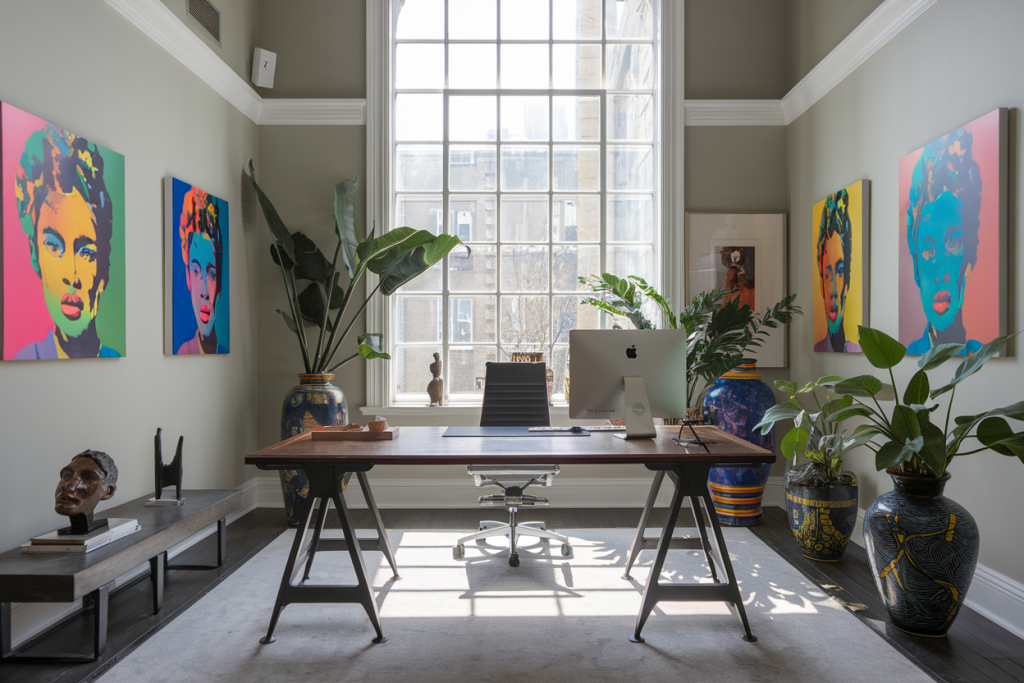Practical Strategies for Reducing Clutter in Nigerian Homes: How Minimalism Can Transform Small Spaces

The Case for Minimalism in Nigerian Homes
Living in Nigeria, where family ties and community often manifest through the shared sentiment of “bringing something home,” it is not uncommon to find homes filled with a myriad of items. From the fabric of an elaborately woven Aso Ebi to an inherited pot from a beloved relative, each piece tends to carry emotional weight. However, as beautiful as these possessions may be, they can contribute to overwhelming clutter and chaotic living environments.
Embracing minimalism offers a refreshing approach to counter this clutter. Minimalism emphasizes intentionality and simplicity, allowing individuals to discern what truly matters in their lives. This doesn’t mean letting go of all belongings; rather, it’s about curating a home environment that enhances peace and productivity. For Nigerian families, especially in bustling urban centers like Lagos or Abuja, adopting a minimalist mindset can yield transformative results.
Transforming Spaces
One of the primary advantages of minimalism is its ability to transform small living areas into functional spaces. In Nigeria, where many dwellings are compact, this is particularly significant. For instance, items that serve dual purposes—like a sofa that converts into a bed—can greatly maximize space without sacrificing comfort. Moreover, reducing the number of decorative items allows homeowners to showcase the charm of fewer, more meaningful pieces, such as art by local Nigerian artists or photographs that tell a family’s story.
Creating Serenity
In chaotic environments, the principle of creating a sense of spaciousness and serenity becomes essential for wellbeing. This can be achieved by regularly decluttering spaces. In practice, this could mean selecting a specific day each month to sort through belongings and keeping only what adds value to your life. This regular routine not only prevents clutter from accumulating but also fosters a sense of control and tranquility.
Enhancing Well-being
As many Nigerians juggle various responsibilities, the stress associated with excess can become a burden. By adopting a minimalist approach, individuals can improve overall well-being by reducing stress associated with excess. The act of simplifying and organizing one’s environment has shown to lead to clearer minds, improved focus, and greater emotional resilience. Focusing on fewer possessions can also lead to a mindset shift towards gratitude, appreciating the importance of quality over quantity.

Implementing minimalism requires determination, especially in a culture that places immense value on material possessions. Nonetheless, with strategies such as maintaining a regular declutter schedule, investing in multifunctional furniture, and limiting decorative items to those that truly resonate, anyone can create a more organized and enjoyable lifestyle.
By embracing the art of minimalism, Nigerian families are not merely enhancing their spaces; they are opening the door to a richer, more fulfilling living experience—one rooted in clarity, purpose, and, ultimately, joy.
LEARN MORE: This related article may interest you
Practical Steps to Embrace Minimalism
To effectively embrace minimalism in a Nigerian home, practical and actionable steps are essential. The transition from a cluttered space to a minimalist one begins with mindset and intention. Below are some strategies that can be employed to significantly reduce clutter while creating a more functional living environment.
1. Assess and Set Clear Goals
The first step towards minimizing clutter is to assess your belongings critically. Begin by asking yourself questions such as:
- What items do I use daily?
- Which belongings bring me joy or serve a purpose?
- Are there items that have not been used in over a year?
Defining clear goals about what you wish to achieve can provide direction and motivation. For example, if your aim is to create a more organized kitchen space, focus on utensils and appliances that are essential for everyday cooking. Setting small, digestible targets can help ease the emotional burden of parting with sentimental possessions.
2. Implement the One-In, One-Out Rule
The practice of minimizing clutter becomes significantly easier with the “one-in, one-out” rule, particularly relevant in a culture that often celebrates accumulation. This strategy dictates that for every new item brought into the home, one must be removed. This not only helps control the influx of possessions but also encourages mindful purchasing habits. Whether it’s a new pair of shoes, a decorative piece for the living room, or a piece of clothing, this discipline will gradually lead to a more intentional lifestyle.
3. Designate Declutter Zones
To sustain a minimalist environment, it can be beneficial to create specific declutter zones around your home. This method involves choosing a place, such as a corner or a shelf, designated solely for items that you plan to eliminate. Whether it includes clothes that no longer fit or furniture that no longer serves a purpose, having a dedicated space allows you to easily manage what needs to go. It also provides a visual cue that can serve as a reminder to regularly review your belongings.
4. Organize by Category, Not by Room
Another effective strategy involves organizing belongings by category rather than room. For instance, gather all clothing from various rooms, assess them collectively, and streamline your wardrobe as a whole. This approach allows for a clearer understanding of what you own and may lead to surprising realizations about excess—such as owning ten pairs of shoes, yet only wearing three regularly. By categorizing items, you can address areas of redundancy and ultimately create a more streamlined space.
Transforming your home into a minimalist space is undoubtedly a process that requires effort and commitment. However, the long-term benefits—reduced stress, increased functionality, and enhanced serenity—bring forth a significant positive change in the living environment. By implementing these practical strategies for reducing clutter, Nigerian families can pave the way towards embracing a minimalist lifestyle while ensuring that their homes remain inviting sanctuaries of comfort and clarity.
Practical Strategies for Reducing Clutter in Nigerian Homes
As urban living grows increasingly crowded, particularly in bustling Nigerian cities, the demand for effective minimalist strategies has never been more vital. Embracing minimalism allows individuals to rethink their spaces and possessions, fostering an atmosphere of tranquility and efficiency. Here are some actionable strategies that can help transform small living areas into organized, clutter-free homes.
| Category | Description |
|---|---|
| Decluttering Techniques | Applying the one-in-one-out rule helps maintain balance in possessions. |
| Functional Furniture | Invest in multi-functional furniture that enhances utility while minimizing space usage. |
Another essential strategy lies in reassessing the purpose of each item in the home. By delving into a mindful evaluation of household belongings, individuals can identify unnecessary items that only serve to contribute to chaos. Think of items that are seldom used; if an object hasn’t been utilized in the past year, it may be time to consider selling or donating it.
Furthermore, consider creating specific zones for items based on their function and frequency of use. This can help streamline daily activities and reduce the likelihood of clutter accumulating in living spaces. Instead of storing kitchen appliances in distant cabinets, for example, keep frequently used items within arm’s reach. This approach not only enhances functionality but also fosters a sense of order that aligns with a minimalist lifestyle.
Finally, utilizing vertical space is a game changer in small homes. Installing shelves and utilizing wall-hanging organizers can free up floor space, promote organization, and display items in an aesthetically pleasing manner. Each of these strategies plays a pivotal role in creating a harmonious living environment that embodies the principles of minimalism, allowing for personal growth, efficiency, and peace of mind.
ADDITIONAL INSIGHTS: Expand your understanding here
Creating Functional Minimalist Spaces
As you begin to apply the principles of minimalism within your Nigerian home, it’s crucial to focus on creating functional spaces that serve your lifestyle’s unique needs. Embracing minimalism doesn’t just mean getting rid of items; it’s about cultivating an environment that supports well-being and efficiency. Here are a few more strategies that can help achieve this goal.
5. Multi-Functional Furniture
In a country where space is often at a premium, investing in multi-functional furniture is a savvy move. Pieces that serve multiple purposes can drastically minimize clutter. For example, consider a sofa bed, which provides both seating and sleeping space without the need for an additional guest bed. Tables with storage compartments or ottomans that open up for extra storage can also hold various items while still looking stylish. Not only do these pieces save space, but they also foster a clean and organized appearance, reinforcing the minimalism ethos.
6. Leverage Vertical Space
When square footage is limited, utilizing vertical space becomes critical. Wall-mounted shelves or hung artwork can significantly decrease floor clutter while still providing adequate storage or decoration. In Nigerian homes, where bright colors and vibrant art hold cultural significance, wall decorations can showcase local talent while keeping floor areas tidy. Installing pegboards in the kitchen for utensils or in the living room for display items can also create a visually appealing space without overwhelming it.
7. Embrace Smart Storage Solutions
Smart storage solutions are a cornerstone of minimalism. Consider adopting storage techniques such as under-bed storage or using decorative baskets and bins that blend with your decor while hiding away miscellaneous items. In small homes, *suction statement cabinets or wall niches* can be created, offering discreet places to store items without taking up additional room. Another practical idea is to declutter seasonal items; for example, store away holiday decorations or clothes that won’t be worn until the next season, keeping only what you need currently easily accessible.
8. Regularly Review and Reassess
A periodic review of your belongings can facilitate ongoing minimalism. Set a schedule—perhaps every three to six months—to evaluate what you own. This recurring assessment encourages a habit of mindfulness towards possessions and helps identify any excess that may have accumulated. In Nigerian households, where family gatherings may lead to an influx of items, having a routine check can assist in managing clutter consistently and prevent overwhelm.
By applying these strategies, Nigerian families can refine their living spaces while staying true to cultural aesthetics and traditional values. Understanding that minimalism is not merely the absence of items but the presence of intentionality can revolutionize how spaces are utilized. Ultimately, a minimalist approach enhances both the functionality and tranquility of a home, creating a gratifying habitat for family life.
SEE ALSO: Click here to read another article
Conclusion
Adopting minimalism in Nigerian homes is not just about creating a visually appealing environment; it’s a transformative approach that can significantly enhance day-to-day living. By implementing the strategies outlined in this article, such as investing in multi-functional furniture, effectively utilizing vertical space, and embracing smart storage solutions, families can drastically reduce clutter and create organized, functional spaces. This shift towards minimalism encourages a greater appreciation for efficiency and well-being, steering households towards intentional living and mindful consumption.
Moreover, regularly reviewing and reassessing belongings play a vital role in maintaining a clutter-free environment. This proactive approach helps families discern what is truly needed versus items that merely accumulate over time. By fostering this awareness and making periodic evaluations a routine, Nigerian households can sustain the principles of minimalism, continuously curating their space in accordance with personal and cultural values.
Ultimately, embracing minimalism in Nigerian homes can lead to profound changes. It promotes tranquility, enhances the use of limited space, and nurtures a harmonious family atmosphere. As families reflect on the significance of each item they own, they may discover not only the joy of living with less but also the capacity to focus more on experiences and relationships. By transforming small spaces through practicality and intention, minimalism opens the door to a nurturing and revitalizing home life.


